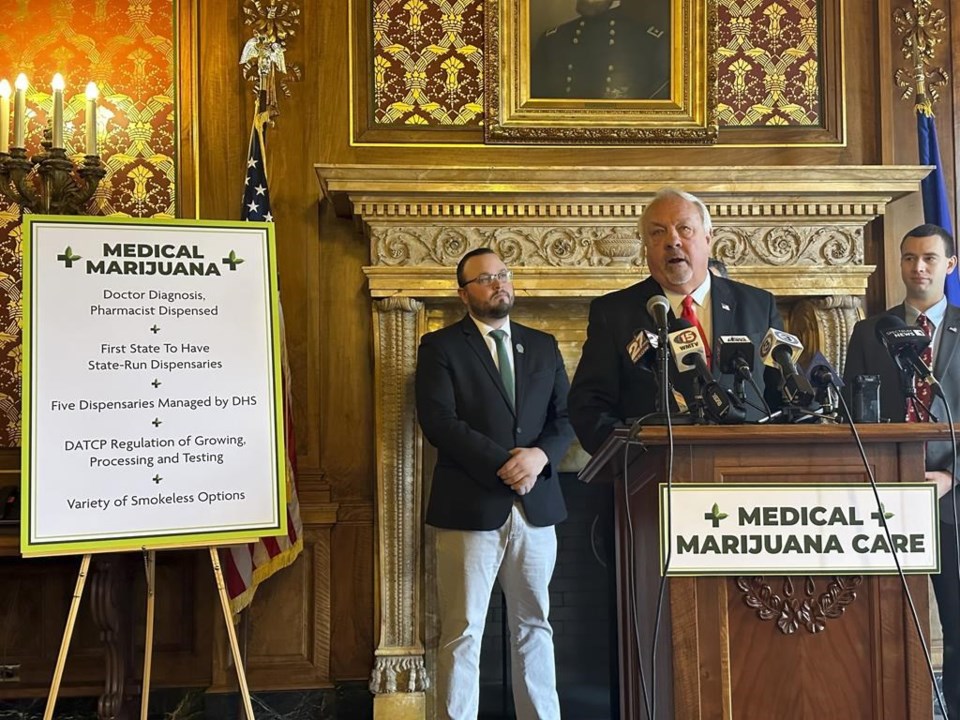MADISON, Wis. (AP) — Wisconsin Assembly Republicans' highly restrictive plan to legalize medical marijuana in the state drew a lukewarm response from Senate Republicans and Democratic Gov. Tony Evers on Monday.
The bill would limit medical marijuana only to severely ill people with chronic diseases such as cancer and allow for it to be dispensed at only five state-run locations. Smokable marijuana would not be allowed.
The measure is far from the full legalization that Evers and Democrats have pushed unsuccessfully to pass for years. Evers said last week that he supports creating a medical marijuana program if that's all that can be done now, but he was noncommittal on the proposal floated Monday.
Evers will review the idea, and “he looks forward to hearing from Wisconsinites and other stakeholders as the bill moves through the legislative process,” the governor's spokesperson Britt Cudaback said.
The bill would have to clear the Assembly and Senate and be signed by Evers before it could take effect.
Last year, Republican Senate Majority Leader Devin LeMahieu said a bill to create a medical marijuana program could pass this legislative session — as long as regulations are put forward to ensure that it would be limited to only those who are in serious pain.
But like Evers, LeMahieu was noncommittal Monday, saying the bill needed to be “thoroughly vetted before the Senate decides how to proceed.”
Democratic Senate Minority Leader Dianne Hesselbein called the measure a “small step in the right direction,” but said she was concerned it was too restrictive.
Republican Assembly Speaker Robin Vos has said that the program detailed in the bill announced Monday was as far as Assembly Republicans could go. Republicans hold a 64-35 majority in the Assembly and a 22-11 advantage in the Senate.
“We want to make this available to people, but we want to have tight controls on it as well,” state Rep. Jon Plumer said at a news conference.
The exact locations of Wisconsin’s dispensaries would be up to the state Department of Health Services, but they would be located in five different regions of the state. Given that recreational marijuana is legal in neighboring Illinois, Minnesota and Michigan, many Wisconsin residents would be closer to a dispensary in another state where they could purchase whatever they wanted.
The Wisconsin Policy Forum estimated in a report last year that more than half of all Wisconsin residents over the age of 21 live within a 75-minute drive to a legal dispensary in another state. And that was before Minnesota legalized recreational marijuana.
In 2022, sales to Wisconsin residents generated more than $36 million in sales tax for Illinois alone, according to a report by Wisconsin’s nonpartisan Legislative Fiscal Bureau.
About $165 million a year in sales taxes were projected to be collected in Wisconsin under Evers’ full legalization plan the Legislature rejected last year.
Medical marijuana would not be subject to Wisconsin sales tax under the new Republican bill, meaning it would not be a moneymaker for the state like it is in Illinois and other states.
“It’s designed to be a break-even program since it is a medical program,” Plumer said.
Patients would be required to have a doctor’s diagnosis to obtain the marijuana at one of only five state-run dispensaries. The number of dispensaries could grow, Plumer said.
Republican Sen. Mary Felzkowski, who has been the biggest proponent for medical marijuana legalization in the Senate, did not work on the bill because she objected to having the state run the dispensaries, rather than private entities. But she praised Assembly Republicans for introducing the bill, saying “any progress towards providing those in need with access to medical marijuana is something to be celebrated.”
Only the patient and up to three caregivers would be allowed to obtain the medical marijuana.
The proposal would limit the availability of marijuana to people diagnosed with certain diseases, including cancer, HIV or AIDS, glaucoma, multiple sclerosis, inflammatory bowel disease, severe muscle spasms, chronic pain or nausea, and those with a terminal illness and less than a year to live.
The marijuana to be dispensed could not be smokeable. But a wide array of other types would be legal, including gummies, concentrates, oils, tinctures, pills, gels, creams, vapors, patches, liquids, or forms administered by a nebulizer.
Wisconsin remains an outlier nationally. Thirty-eight states have legalized medical marijuana and 24 have legalized recreational marijuana. The push for legalization in Wisconsin has gained momentum as its neighbors have loosened their laws.
Marquette University Law School polls have shown large majority of Wisconsin residents have supported legalizing marijuana use for years.
Scott Bauer, The Associated Press



